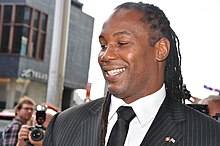Lennox Lewis | ||||||||||||||||||||||||||||||||||||||||||||||||
|---|---|---|---|---|---|---|---|---|---|---|---|---|---|---|---|---|---|---|---|---|---|---|---|---|---|---|---|---|---|---|---|---|---|---|---|---|---|---|---|---|---|---|---|---|---|---|---|---|
 Lewis in 2010 | ||||||||||||||||||||||||||||||||||||||||||||||||
| Born | Lennox Claudius Lewis 2 September 1965 London, England | |||||||||||||||||||||||||||||||||||||||||||||||
| Nationality |
| |||||||||||||||||||||||||||||||||||||||||||||||
| Other names | The Lion | |||||||||||||||||||||||||||||||||||||||||||||||
| Statistics | ||||||||||||||||||||||||||||||||||||||||||||||||
| Weight(s) | Heavyweight | |||||||||||||||||||||||||||||||||||||||||||||||
| Height | 6 ft 5 in (196 cm)[1] | |||||||||||||||||||||||||||||||||||||||||||||||
| Reach | 84 in (213 cm)[1] | |||||||||||||||||||||||||||||||||||||||||||||||
| Stance | Orthodox | |||||||||||||||||||||||||||||||||||||||||||||||
| Boxing record | ||||||||||||||||||||||||||||||||||||||||||||||||
| Total fights | 44 | |||||||||||||||||||||||||||||||||||||||||||||||
| Wins | 41 | |||||||||||||||||||||||||||||||||||||||||||||||
| Wins by KO | 32 | |||||||||||||||||||||||||||||||||||||||||||||||
| Losses | 2 | |||||||||||||||||||||||||||||||||||||||||||||||
| Draws | 1 | |||||||||||||||||||||||||||||||||||||||||||||||
Medal record
| ||||||||||||||||||||||||||||||||||||||||||||||||
Lennox Claudius Lewis CM CBE (born 2 September 1965) is a boxing commentator and former professional boxer who competed from 1989 to 2003. He is a three-time world heavyweight champion, a two-time lineal champion, and held the undisputed championship. Holding dual British and Canadian citizenship,[2] Lewis represented Canada as an amateur at the 1984 and 1988 Olympics; in the latter, he won a gold medal in the super-heavyweight division.
In his first three years as a professional, Lewis won several regional heavyweight championships, including the European, British, and Commonwealth titles. After winning his first 21 fights, he defeated Donovan Ruddock in 1992 to take over the number one position in the World Boxing Council (WBC) rankings. He was declared WBC heavyweight champion later that year after Riddick Bowe gave up the title refusing to defend it against Lewis. He defended the title three times before an upset knockout loss to Oliver McCall in 1994. Lewis avenged the loss in a 1997 rematch to regain the vacant WBC title.
Two fights against Evander Holyfield in 1999 (the first ending in a controversial draw) saw Lewis become undisputed heavyweight champion by unifying his WBC title with Holyfield's World Boxing Association (WBA) and International Boxing Federation (IBF) titles. He also won the vacant International Boxing Organization (IBO) title. In 2000, the WBA stripped Lewis of his title when he chose to face Michael Grant instead of mandatory challenger John Ruiz. Similarly, the IBF stripped Lewis of their title in 2002 when he chose not to face their mandatory challenger Chris Byrd.
Lewis was knocked out by Hasim Rahman in an upset in 2001, but this defeat was avenged later in the year. In 2002, Lewis defeated Mike Tyson in one of the most highly anticipated fights in boxing history. Prior to the event, Lewis was awarded the Ring magazine heavyweight title, which had been discontinued in the late 1980s. In what would be his final fight, Lewis defeated Vitali Klitschko in a brutal and bloody encounter in 2003. He vacated his remaining titles and retired from boxing in 2004.
Lewis often refers to himself as "the pugilist specialist". He is 6 ft 5 in (1.96 m) tall, with an 84 in (213 cm) reach, and weighed about 245 lb (111 kg) during his boxing prime. Having defeated every opponent he faced, Lewis is regarded by many as one of the greatest heavyweight boxers of all time, and one of the greatest British fighters of all time.[3][4]
- ^ a b HBO Sports tale of the tape prior to the Mike Tyson fight.
- ^ Mee, Bob (18 April 2001). "Angry Lewis caught in the crossfire". The Daily Telegraph. London. Archived from the original on 9 December 2007. Retrieved 22 March 2007.
- ^ "Lennox Lewis: One of the greatest ever". Boxingnews24.com. 3 May 2013. Retrieved 25 February 2016.
- ^ "Lennox Lewis is, "The best heavyweight of all time"". 15 July 2000. Archived from the original on 27 October 2021. Retrieved 25 February 2016 – via YouTube.